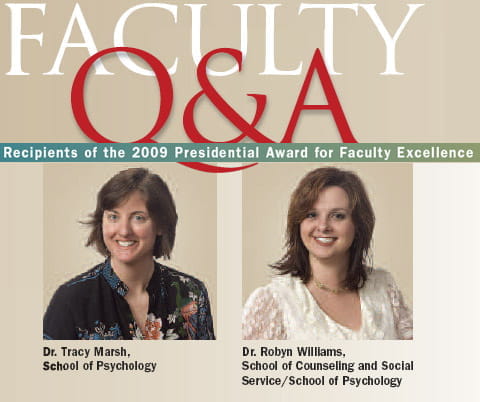
What is the primary thing you hope Walden psychology and counseling students learn?
Dr. Tracy Marsh, School of Psychology: One of the key things is being flexible. No matter how well you plan out your path, students who can adapt to unexpected change fare better.
Dr. Robyn Williams, School of Counseling and Social Service/School of Psychology: More than anything, I hope they learn ethical practice, so that whatever they do does not harm the client in any way.
What are the most important factors to becoming successful in your field?
Marsh: Having a passion for this area. Being willing to put in the time and hard work. And having a good support system and a really good sense of humor.
Williams: Being a counselor is not just what you do, it's who you are. Most people who pursue counseling already come with good interpersonal skills. But if not, they can learn skills like empathy and how to listen.
What Walden resources should students take advantage of more than they do?
Marsh: The library, without a doubt—the library staff will go above and beyond to help you find a resource. And the Writing Center. It's very valuable to have an expert in academic writing look over your work.
Williams: All of the faculty really do want to mentor students and have students co-publish and co-present with us. Students should search out those opportunities.
What are the benefits of an advanced degree in your field?
Marsh: A doctorate opens up your career opportunities tremendously— it allows you to teach and do research at a university level, as well as work as a clinician. Also, some of what you learn in graduate school will become obsolete within several years, so it's imperative that you continue your learning to be effective in your field.
Williams: People can't practice as counselors without a master's degree. Earning a Ph.D. opens the door for upward movement within the profession—if you want to train other counselors or pursue certain positions, such as being director of an agency. Lifelong learning is kind of inherent to the counseling profession because almost all states mandate continuing training, and post-master's coursework can contribute to CEUs (continuing education units).
What does mentoring mean to you?
Marsh: Modeling appropriate knowledge, skills, and attitude. And sharing—when appropriate—some of my own developmental experiences, to help normalize what students might be going through.
Williams: It's my mission to teach students that counseling is more than a job; it's about being part of a group of people who can stand together and advocate for the rights of our clients and for the profession.



